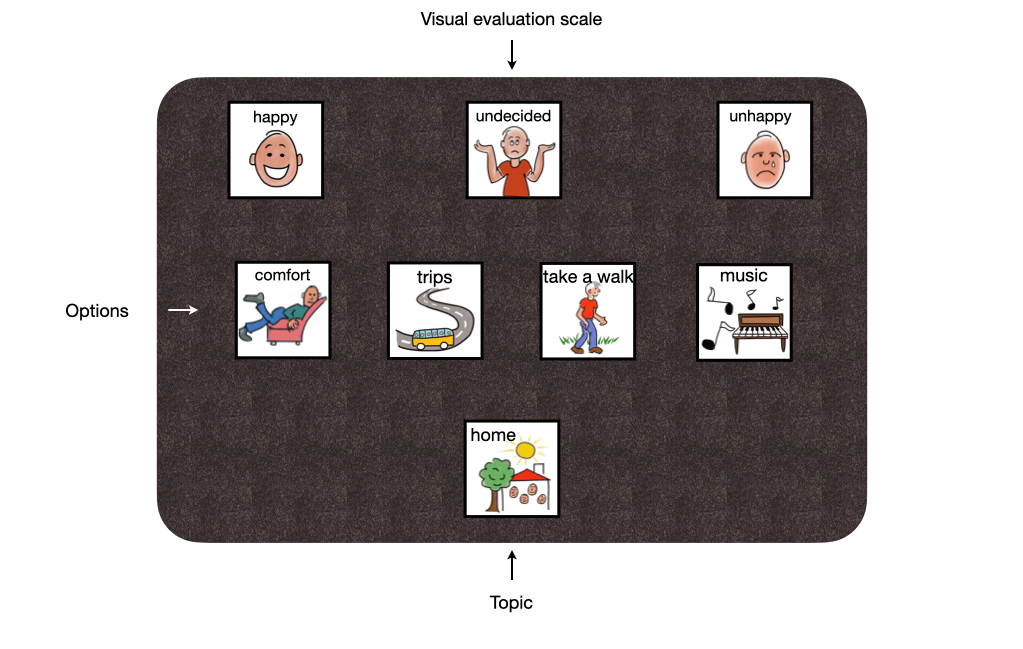Communication
Communication is an essential part of dementia management
When talking to people with dementia a number of factors need to be considered, each of which influences the communication process. Hearing difficulties, cognitive impairments and language deterioration may make it difficult for them to engage in a conversation, regardless on which side of the communication channel they are.
General recommendations for communicating with people with dementia
Try to communicate as conventionally as possible with people with dementia. Over time, it may be advisable to adapt your communication style to the cognitive abilities, cultural background, previous habits, and individual characteristics of the person with dementia.
Criticism and controversy can always be difficult for the person with dementia to understand, so recognize and accept the subjective viewpoint of the person with dementia to avoid embarrassment and conflict.
Speech and language impairment at different stages of dementia
Language and speech difficulty varies by type and stage of dementia. As dementia progresses the ability of verbal expression and understanding deteriorates significantly. At the initial stages of dementia people are still able to engage in meaningful conversations. However, subtle changes of spontaneous speech may already be present, e.g., delayed responses, pauses between words, slow verbal output, slowed speech due to word finding difficulty, and reduced content of communication. At the stage of severe dementia, a person with dementia may only be able to produce single words or sounds. At this stage, non-verbal communication can still be a way of communicating. Decline of semantic memory (knowledge of the meaning of words) also impacts on speaking, understanding, writing and reading.
Speech and language impairment in different forms of dementia
In dementia due to Alzheimer’s disease, word finding difficult is the most conspicuous early language symptoms. At later stages, the ability to understand words also deteriorates. There are two variants of dementia due to Frontotemporal degeneration where impairment of language is the earliest and leading symptom. In the variant “Primary non-fluent aphasia” the problem is producing verbal output. In the variant “Semantic dementia” the meaning of words, objects and faces is gradually lost.
The role of speech and language therapists
Speech and language therapists assess the nature and extent of impaired communication. They offer tools and exercises that take advantage of preserved communication skills or apply compensatory strategies. Speech and language therapists can also help with swallowing problems, which may arise at an advanced stage of dementia and are a particular problem in frontotemporal dementia.
A low-tech tool that speech and language therapists use is called „Talking Mats“. It allows people to express their emotions through pictures and symbols on a simple mat. The tool is easy to make and has simple instructions on how to use it. It enables people with speech difficulties to engage in a conversation and express their opinion and feelings about different topics, thus increasing the efficiency of communication.

References
- Harnish S, Neils-Strunjas J. In Search of Meaning: Reading and writing in Alzheimer's Disease. Semin Speech Lang 29: 44-59, 2008
- Laforce R. Behavioural and language variants of frontotemporal dementia: A review of key symptoms. Clin Neurol Neurosurg 114: 2405-2410, 2013
- Murphy J, Gray C, van Achterberg T et al. The effectiveness of the Talking Mats framework in helping people with dementia to express their views on well-being. Dementia 9: 454-472, 2010
- Tang-Wai DF, Graham NL. Assessment of language function in dementia. Geriatr Aging 11: 103–110, 2008
